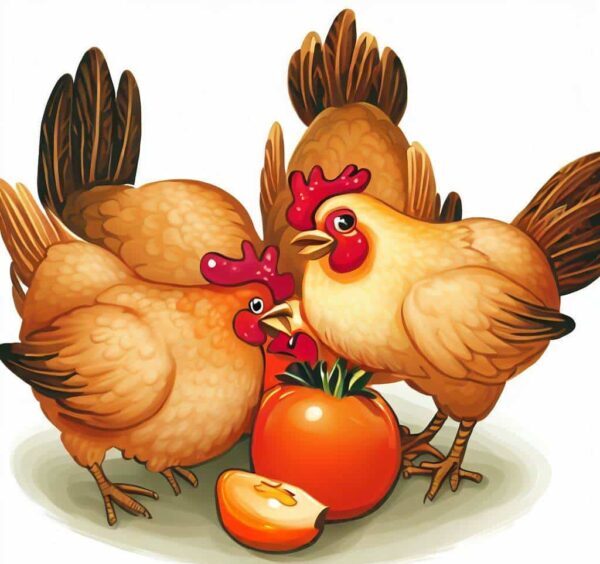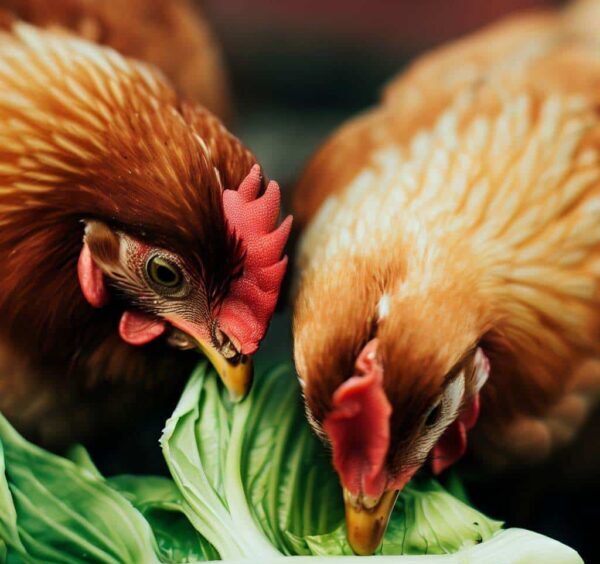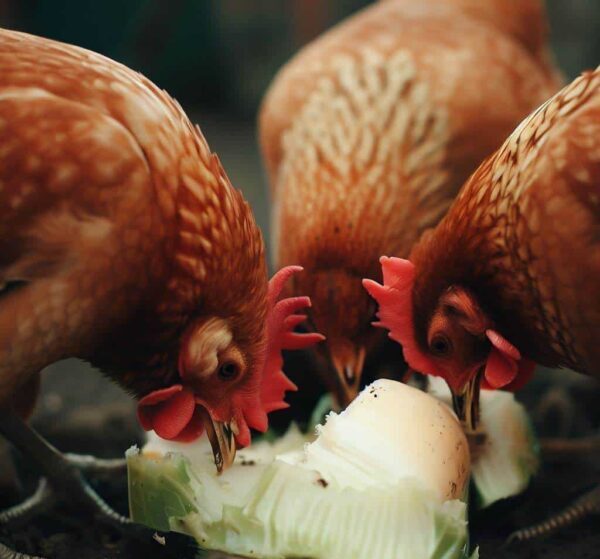Can Chickens Eat Persimmons? Benefits & Drawbacks | Expert Advice

Chickens can eat persimmons as it is rich in vitamins that help their digestion, immune system, and overall growth. But only give persimmons to chickens in moderation as too much sugar can be harmful for chickens.
To further elaborate on the topic this article aims to explain the following things
- What Are Persimmons?
- What Is The Nutritional Content Of Persimmons?
- What Are The Nutritional Benefits Of Persimmons?
- What Are the Potential Drawbacks Of Persimmons For Chickens?
- How To Feed Persimmon Leaves To Chickens?
- What Are the Foods To Avoid Giving Chickens?
- Can Chickens Eat Persimmons Skin?
What are Persimmons?

Persimmons, a type of fruit, come in various varieties like Fuyu, Hachiya and are part of the Ebenaceae family . They offer a unique combination of sweet and tangy flavors that will tantalize your taste buds.
Persimmons are also packed with essential nutrients such as fiber and vitamin A and have been enjoyed in a variety of dishes. Other fruits of Ebenaceae family includes:
- Ebony fruits
- Mabolo
- Sapote
What Is the Nutritional Content of Persimmons?
According to FoodData Central, A 100-gram serving of persimmons contains (1)
| Nutrient | Value |
|---|---|
| Water | 80.3 grams |
| Energy | 70 kcal |
| Protein | 0.58 gram |
| Total lipid (fat) | 0.19 gram |
| Fiber, total dietary | 3.6 grams |
| Calcium | 8 milligrams |
| Iron | 0.15 milligram |
| Magnesium | 9 milligrams |
| Phosphorus | 17 milligrams |
| Potassium | 161 milligrams |
| Sodium | 1 milligram |
| Zinc | 0.11 milligram |
- Vitamins: Persimmons are rich in vitamins A and C, essential for maintaining good health. These vitamins help support your immune system, promote healthy skin, and improve vision.
- Dietary Fiber: With their high fiber content, persimmons can aid digestion and keep you full for longer periods. This makes them an excellent choice for maintaining or losing weight.
- Potassium and Manganese: Persimmons contain important minerals like potassium and manganese. Potassium helps regulate blood pressure and supports proper muscle function, while manganese contributes to bone health.
- Antioxidants: The fruit is also loaded with antioxidants that help protect your cells from damage caused by harmful free radicals. Antioxidants are crucial in reducing the risk of chronic diseases such as heart disease and certain cancers.
What Are the Nutritional Benefits of Persimmons?
The following are the nutritional benefits of persimmons
Supports healthy digestion
Persimmons are packed with dietary fiber, which aids in maintaining a healthy digestive system. The high fiber content helps regulate bowel movements and prevent constipation, ensuring smooth digestion according to PubMed Central. (1)
Boosts the immune system
With their rich vitamin C content, persimmons can give your immune system the extra boost it needs. Vitamin C strengthens the body’s defenses against illnesses and keeps your flock healthy according to PubMed Central (2).
Reduces the risk of chronic diseases
Persimmons contain antioxidants that are crucial in reducing the risk of chronic diseases. Antioxidant combinations in chicken diets have shown additional protective effects against lipid peroxidation in the breast muscle according to PubMed Central. (3)
Incorporating persimmons into your diet can bring numerous health benefits to you and your bird.
What Are the Potential Drawbacks of Persimmons for Chickens?
The following are the potential drawbacks of persimmons for chickens
Unsuitable for Certain Health Conditions
Chickens with specific health conditions should avoid consuming persimmons due to their high sugar content. For instance, chickens with diabetes or obesity may face complications if they consume large quantities of this fruit.
Intestinal Blockage from Seeds
It is important to prevent chickens from overindulging in persimmon seeds. These seeds contain tannin, which can form clumps and potentially lead to intestinal blockages in chickens if consumed excessively.
Monitoring the quantity and frequency of feeding persimmons to your flock will help ensure their well-being and prevent any adverse effects on their digestive health.
How to Feed Persimmon Leaves to Chickens?
To feed persimmon leaves to chickens follow this procedure
- Safety First: While chickens can eat persimmon leaves, it’s important to remember that moderation is key for their flocks. Offer small amounts of fresh leaves as an occasional treat rather than a staple in their diet.
- Thorough Washing: Before giving the persimmon leaves to your flocks, wash them thoroughly. This helps remove any dirt or potential contaminants that could harm your feathered friends.
- Avoid Wilted or Spoiled Leaves: Only offer fresh, healthy persimmon leaves to your chicken flock. Wilted or spoiled leaves may contain toxins that could be harmful when consumed by bird flocks.
- Introduce Gradually: If introducing persimmon leaves to your flocks for the first time, start with a small quantity and observe how your chickens react. Some birds may have preferences, while others might not immediately like this new addition.
- Other Treat Options: Persimmons aren’t the only treats you can give your chicken flock! Consider other safe options like beans, peanuts (without salt), fish scraps, bread crumbs, or even leftover table scraps (avoiding anything toxic like chocolate).
Remember, while persimmons are generally safe for chickens in moderate quantities, avoid feeding them the fruit’s flesh as it can upset their digestive system due to its high sugar content.
Can Chickens Eat Persimmons Skin?
Yes, chickens can eat persimmon skin if it’s clean and pesticide-free. The skin of persimmons contains additional nutrients and fiber that can benefit the chickens. However, it is important to offer its skin in moderation as too much may cause digestive issues.
- Persimmon skin is nutritious for chickens.
- Clean the persimmon skin before feeding it to chickens.
- Avoid pesticide residues on persimmons for chicken health.
- Persimmon skin provides fiber for digestion in chickens.
- Introduce new foods gradually to prevent digestive upsets.
- Monitor chickens for adverse reactions or digestive problems.
- Reduce or eliminate persimmon skin if discomfort occurs.
By following these guidelines and offering persimmon skins in moderation, you can provide your chickens with an extra source of nutrients while ensuring their well-being.
What Are the Foods to Avoid Giving Chickens?
Chickens are birds that like different foods. But some things can be bad for them. Be careful what you give them.
Here are some foods that should be kept off the menu for chickens.
- Toxic or Harmful Foods: Certain foods can be toxic or harmful to chickens. Chocolate and avocado pits/peels fall into this category and should never be given to chickens.
- Citrus Fruits: While chickens can enjoy a wide range of fruits, citrus fruits like lemons and oranges should be given sparingly due to their acidity levels. Too much acid can upset their digestive system according to ResearchGate (4).
- Processed Foods: Like humans, chickens should avoid processed foods high in salt, sugar, or artificial additives. These types of meals can have negative effects on their overall health.
Instead of offering these potentially harmful options, consider providing your feathered friends with good chicken treats that are safe and nutritious. Here are some great chicken treat ideas:
- Vegetables: Chickens love a variety of vegetables, such as leafy greens (spinach, kale), cucumbers, bell peppers, and carrots.
- Fruits: Offer them small portions of safe fruits like berries (strawberries, blueberries), watermelon (without seeds), or sliced apples.
- Grains: Treat your chickens with grains like cooked rice or oats, which provide energy and fiber.
- Protein-Rich Meals: Eggs (yes, they love their own kind!) or mealworms make excellent protein sources for your poultry pals.
Avoiding toxic fruits or vegetables and opting for healthier alternatives will ensure your chickens stay happy and healthy while enjoying their tasty treats.
What Fruits Should I Give To My Chicken?
Here’s a list of fruits that chickens can enjoy in moderation as part of a balanced diet:
- Apples: A good source of fiber, vitamins, and minerals. Cut them up into bite-sized pieces and remove the seeds before giving them to your chickens
- Bananas: Rich in potassium and magnesium. Offer them ripe bananas in moderation, as too much sugar can be unhealthy for chickens.
- Berries: Packed with antioxidants and vitamins. Blueberries, raspberries, and strawberries are all safe for chickens. Be mindful that their poop might turn slightly blue or red after eating berries.
- Cantaloupe and Honeydew Melons: High in water content, making them a refreshing treat on hot days. Make sure to remove the rinds and seeds first.
- Grapes: A good source of hydration and sugar. However, limit the amount you give them, as too much sugar can cause digestive issues.
- Kiwi: Full of vitamin C and antioxidants. Cut them up into small pieces before feeding them to your chickens.
- Mango: A delicious treat rich in vitamins and fiber. Only offer them the fleshy part of the fruit and remove the pit, which is toxic to chickens.
- Peaches and Nectarines: Remove the pits before offering them to your chickens, as they contain cyanide, which is harmful.
- Pumpkins: A nutritious source of vitamins and fiber, especially good during the fall season. You can even feed them pumpkin seeds, but only in moderation.
- Watermelon: A hydrating summer treat full of vitamins and antioxidants. Remove the seeds before giving it to your chickens.
Remember, these fruits should only be given to chickens as occasional treats and should not make up a significant portion of their diet. Their primary source of food should be a balanced commercial chicken feed.
Can Chickens Eat Persimmons? Key Takeaways
Chickens can eat persimmons. They are a healthy fruit for chickens as they contain vitamins that help their digestion, immune system, and growth.
Persimmons also have fiber that helps with digestion. But be careful; too much sugar can cause tummy problems. So, give persimmons to chickens in moderation.
Take off the skin to make it easier for them to eat. Some treats like chocolate, caffeine, avocado pits, skins, onions, and raw potatoes are bad for chickens.
Ask a vet if you see any problems after giving chickens persimmons or any new food. Chickens need a balanced diet with good chicken feed as their main food.
FAQs
Yes! Adult chickens can also enjoy the benefits of eating persimmons in moderation. Just make sure to remove the skin before feeding them.
Yes, both Fuyu and Hachiya persimmons are safe for chickens to consume. However, make sure they are ripe and not overly soft or unripe.
No, it is best to avoid feeding your chickens persimmon seeds as they can be a choking hazard.
Chicken should be given as an occasional treat rather than a regular part of their diet. Once or twice a week is sufficient for persimmons.
No, persimmons should not replace chicken feed entirely. They should be offered as a supplement or treat in addition to their regular balanced diet.
Sources
VeryWell Animals uses high-quality sources, such as scientifically reviewed studies in its articles. Discover our unique approach to fact-checking and ensuring our content remains accurate and trustworthy.
- Nutritional Content Of Persimmons – Food Data Central
- Role of Dietary Fiber in Poultry Nutrition– National Library of Medicine
- The Role of Vitamin C For Supporting Immune Health in Poultry – Natural Remedy
- Antioxidants in Poultry Nutrition – National Library of Medicine
- Effects of Lemon Juice on Performance of Chickens – Research Gate
Last Updated on 28 February 2024
Waman Nuka is a seasoned wordsmith and a passionate animal enthusiast with decades of experience in the world of animal care. With a deep love for all creatures great and small, Waman’s journey in the realm of animals started as a young boy exploring the lush forests surrounding his childhood home.


